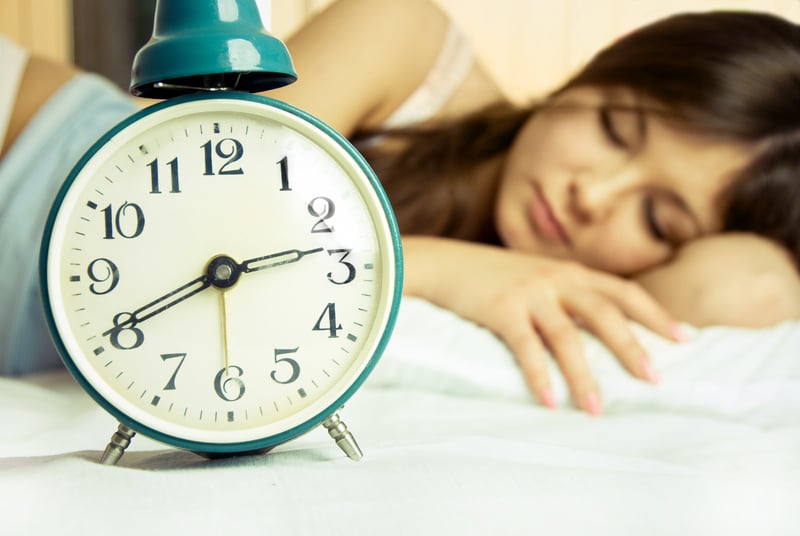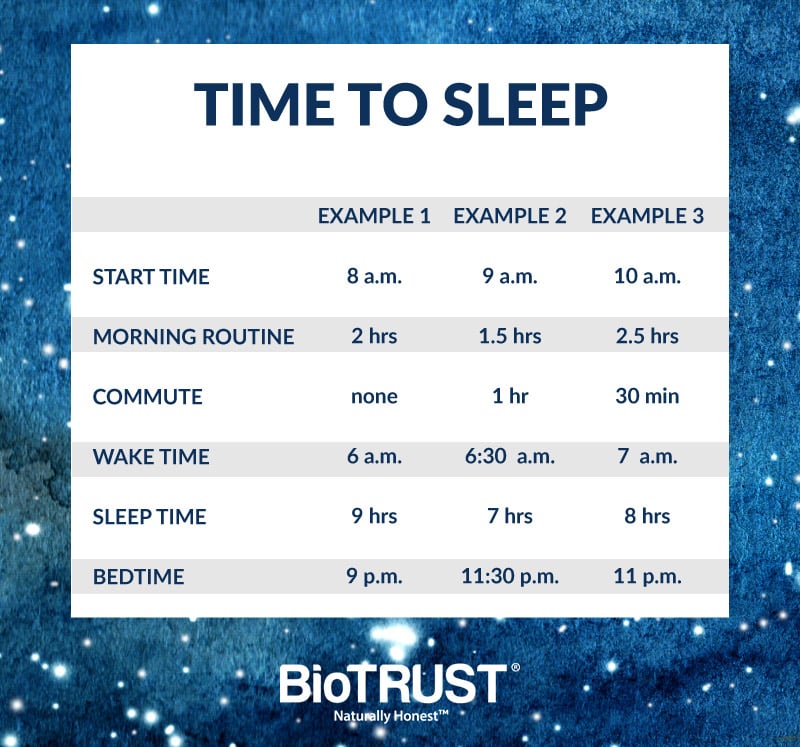What Is the Best Time to Sleep and Wake Up?

Once upon a time, humans would go to sleep when the sun set and wake up when the sun rose. Our circadian rhythms were set by nature. Then we found ways to light up our nights—starting with candles and fire followed by the electricity we so depend on (and enjoy) now. This allows us to extend our days—up to 24 hours, no matter what time the sun sets. “Sleep, who needs it?” we tend to ask ourselves. After all, there’s so much to do. Of course, the answer is that we all need sleep! Yet discovering the best time to sleep and wake up can be elusive.
Especially over the last year and a half, many of us found our routines sorely disrupted, if not wholly upended. Most of us can admit that bedtime was challenging to keep consistent even before that. Yet, with increased stress, disrupted routines, and often extended screen time, for many of us sleep schedules have been thrown completely out of whack.
If you’re feeling exhausted and are looking for the magical sleep number to fix your routine, you’re not alone.
Best Time to Sleep?
Wouldn’t it be nice if the clock struck a certain hour, and your body could simply drift off to sleep and stay asleep all night? Then you’d wake up refreshed, revived, and ready to take on the day? We can only dream…
While it is ideal to go to sleep while it’s dark and wake up when it’s light, unfortunately, there’s no magical time. And even if you practice good sleep hygiene and use tools to help you get to sleep faster, the best time is different for everyone. Plus, it changes throughout life, even for the same person. For example, your age, as well as your genes, environment, health condition, activity levels, and more, can all affect how much sleep you need.
That said, the average adult needs between seven and nine hours each night. 1,2 Some adults need a bit more (up to 10), and some require a bit less (a mere 6). Sleep debt can also affect how many hours your body needs. If you’ve been missing out on quality sleep for a few nights, you may need to make up for the lack with some extra sleep.
Many people think that the optimal amount of sleep is at the high end of the scale for their age group. That’s not necessarily true. In fact, if you naturally sleep seven hours a night and try to push it up to nine hours (when not in sleep debt), you could decrease sleep quality and make your sleep problems worse rather than better.
Best Time to Wake?
Instead of looking at what time you go to sleep at night, it’s best to determine what time you want to wake up every morning. Jobs, school, family and community obligations determine this number for many of us. Others may choose to look at when the sun rises and use that to gauge when they wake up. Still others may have the freedom to discover what time their bodies and minds naturally wake up.
In truth, there’s no magical time to wake up in the morning, either. Because of sleep inertia, which causes us to be groggy as we wake up, many experts recommend giving yourself 2.5 to 3 hours after you wake up to begin work. This is because that’s when we’re most alert and therefore more productive.
But what time you wake up determines everything else. By aligning your wake time with the amount of sleep your body needs, you can assess your personal magical bedtime hour. What’s most important, however, is remaining consistent—even on the weekends—within about an hour. Otherwise, the altered sleep hours on the weekend can cause you to feel groggy throughout the week.
There are significant individual differences as well due to biological tendencies and circadian rhythms. The circadian rhythm just means the brain’s natural schedule for waking and sleeping, which is determined by our individual internal clocks.
You may have noticed that you naturally feel more awake at some times of day and naturally sleepier at others. For example, most people experience natural energy drops between 1 and 3 p.m. and again between 2 and 4 a.m. Yet, the circadian rhythm also adapts to the schedule you typically keep.
If you have an irregular schedule (for example, you’re a shift worker) or if your schedule gets disrupted several times throughout the week, this can throw off your circadian rhythm. And, you may find you’re drowsy at unexpected times throughout the day.
One of the best ways to help readjust your circadian rhythm is to use sunlight. Simply get outside or at least to a bright window when you first wake up. Better yet, take a morning walk or jog to soak in the sun and fully awake to a new day.
At the day’s end, you can better support the circadian rhythm by removing light, especially blue light, about an hour and a half before bedtime.
Formulating Your Ideal Wake and Bedtime
If you need to wake up to be at work by, say, 8 a.m., and you have a 30-minute commute and want to get in a 30-minute workout, your ideal time will differ dramatically from someone who can roll out of bed to hit their home computer for remote work at 9 a.m. This is particularly true if you prefer to exercise in the afternoon. That’s obvious, I know. But it all comes into play in determining when you wake up and, therefore, when you go to sleep.
Add in differences in individuals who may only need seven hours of nightly sleep versus those who are more alive and awake after closer to nine. And even within the same household, the best time to sleep and wake up may be vastly different.
So, determining when you wake up may be determined by when you need to be at work or school, minus the amount of time it takes for your morning routine and commute to work.
Once you’ve determined your wake time, do some simple math, subtracting the number of hours your body needs, and you’ll be able to decide the best time to sleep.
Then it’s just a matter of adjusting over time to become consistent with a sleep and wake pattern. As your body better adjusts, it will begin to tell you when it’s time to go to sleep, and you’ll start to wake (likely with no alarm needed) right on time.
If you used to start your workday at 10 a.m. and now need to begin at 8 a.m., it can take time to adjust your body to the new wake and sleep time. But the general formula stays the same. Here are three common examples:

Again, it all depends on what time your day “starts” and, therefore, what time you wake up and how much sleep your body needs.
If you don’t want to do all the math in your head, the Sleep Foundation has a handy calculator. You simply select your age range, how many hours of sleep you want, and when you want to wake up (or when you want to go to bed), and the calculator does the rest.
One caveat: recent research has discovered that folks who burn the midnight oil tend to have more repetitive negative thoughts and feelings throughout the day than folks who tend to go to bed a bit earlier. This was found in both people who got less sleep and those who just delayed going to bed. 3 Other research found that people who go to bed later are more likely to experience depression. 4 So, even if you have no obligations until the middle of the day, it’s likely worth it to get to bed earlier, if possible, to support a happier, healthier mood.
Other side effects of not getting enough sleep regularly include getting sick more often, high blood pressure, heart disease, depression, diabetes, and obesity.
On the other hand, getting too much sleep also comes with side effects like depression, irritability, and cardiovascular disease.
Consistency is Key
Especially if you have an early morning wake-up call during the week, it can be super tempting to stay up later on the weekends and make up for it by sleeping in a bit on Saturdays and Sundays. Unfortunately, that flexibility comes at a cost. Researchers at Harvard University and Brigham and Woman’s hospital found that having a more regular wake time, combined with the same amount of nightly sleep, leads to improved productivity and performance. 5
Establishing a sleep routine will also allow you to better recognize when your body is sleepy. For example, if you’re focused on TV, video games, work (including school work), or playing on your phone, you’re stimulating your mind, which tends to make sleep elusive. Instead, allow your body and mind to wind down with some gentle stretches, reading, and/or deep breathing to help your body let go and sleep.
The sun is a wonderful tool to use, as the body and brain naturally respond to the sun rising and setting. However, depending on your location and the time of year, this can be difficult. In that case, it may be worth considering the use of sun-simulating lamps that gently light up your bedroom as it gets closer to the time when you want to wake up. Dawn simulation has also been found to help relieve seasonal affective disorder (SAD). 6
Best Time to Sleep and Wake Up: A Recap
Rather than forcing an unnatural or overambitious bedtime, start with what time you really want (or need) to wake up. As your body adjusts to your new wake schedule, allow your body to naturally wind down and get sleepy in the evenings by turning off devices. Soon, you’ll discover the best time to sleep and wake for you, your circadian rhythm, and your schedule and obligations.
Once you’ve created and maintained a more stable time to sleep and wake up, your internal clock can take over, helping everything else stay on schedule. In short, if you listen to your body and follow its rhythms, you’ll find your magical sleep time to function at a higher level every day!





 7 Signs Your Body is Seriously Low on Collagen (not just wrinkles)
7 Signs Your Body is Seriously Low on Collagen (not just wrinkles) Health Expert: "Turmeric Doesn't Work (unless...)"
Health Expert: "Turmeric Doesn't Work (unless...)" 3 Warning Signs Your Probiotic Supplement is a Total Waste
3 Warning Signs Your Probiotic Supplement is a Total Waste

